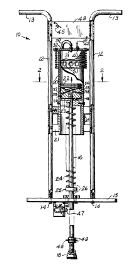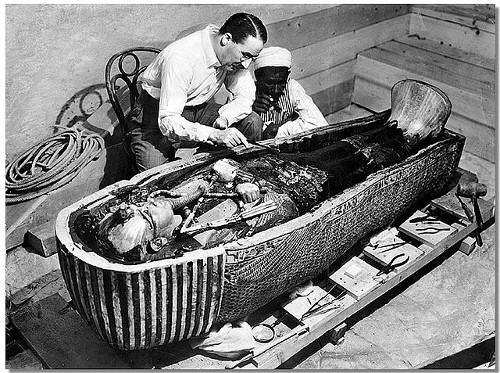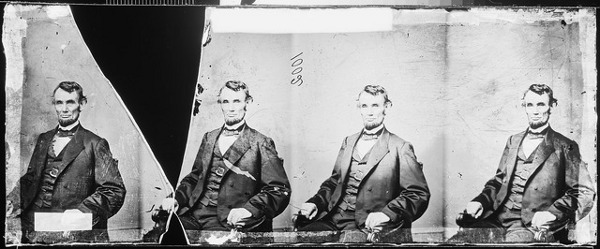
Reversing the Dutch word for kidney, NIER, gives the French word for kidney, REIN.

Reversing the Dutch word for kidney, NIER, gives the French word for kidney, REIN.

Gordon Spitzmesser’s “combustible gas-powered pogo stick,” patented in 1960, is exactly what it sounds like: a pogo stick with an internal combustion engine.
“In using this device, the cycle is started by the operator giving the initial jump upon the foot rest. As the frame reaches the bottom of its stroke, thus causing ignition of the sparkplug, the resulting compression forces the ball valve to seat and remain seated during the compression stroke of the piston and until it passes the exhaust ports in the manner described. The instant that the cylinder is cleared, new air and gas is permitted to enter into the cylinder, thus enabling the cycle to be repeated.”
All of this, we are told, is “extremely safe and harmless and of tremendous entertainment value.” You go first.

Letter from the Bishop of Chelmsford to the Times, Feb. 3, 1923:
Sir, I wonder how many of us, born and brought up in the Victorian era, would like to think that in the year, say, 5923, the tomb of Queen Victoria would be invaded by a party of foreigners who rifled it of its contents, took the body of the great Queen from the mausoleum in which it had been placed amid the grief of the whole people, and exhibited it to all and sundry who might wish to see it?
The question arises whether such treatment as we should count unseemly in the case of the great English Queen is not equally unseemly in the case of King Tutankhamen. I am not unmindful of the great historical value which may accrue from the examination of the collection of jewelry, furniture, and, above all, of papyri discovered within the tomb, and I realize that wide interests may justify their thorough investigation and even, in special cases, their temporary removal. But, in any case, I protest strongly against the removal of the body of the King from the place where it has rested for thousands of years. Such a removal borders on indecency, and traverses all Christian sentiment concerning the sacredness of the burial places of the dead.
J.E. Chelmsford
In 1969, Sufi scholar Idries Shah published a volume called The Book of the Book. Its opening pages told of a king whose people would not listen to his teachings, as he lacked an instrument with which to teach them.
The king meets a stranger who tells him of a revered wise man who attributed his knowledge to a tome kept in a place of honor in his room. When the wise man died, his followers eagerly opened the book and found writing on only one page. “When you realise the difference between the container and the content,” it said, “you will have knowledge.”
The rest of Shah’s 200-page book was blank.
In 1968 British police constable David Morris was directing Vincent Fagan to a parking space when Fagan’s car ran onto his foot. Morris shouted at him to move the car, but Fagan refused and turned off the ignition. Eventually he started it again and moved off, but he was convicted of assault for the incident.
This raises a curious legal point. Normally Western law recognizes a crime only if a guilty action and a guilty intent occur at the same time. Here it seems that Fagan’s guilty action (rolling onto Morris’ foot) was a simple accident, and his guilty intent (his resolution not to move) occurred only later. Does that mean that he had committed no crime?
No, it doesn’t, ruled the English court of appeal. Fagan’s guilty action extended continuously while the constable’s foot was pinned under his tire, and he became guilty of assault a soon as he formed the resolution not to move the car. His appeal was dismissed.
(Fagan v Metropolitan Police Commissioner [1969] 1 QB 439)
What’s unusual about this sentence by Harry Mathews?
Once brought into this country, partly imprudent gray barbers marry expatriate, parrying the frictions of tried friends such as Mary, the sorry crook with no work at hand, who is now without a murmur getting pastry.
It remains a sentence when you remove the Rs:
Once bought into this county, patly impudent gay babes may expatiate, paying the fictions of tied fiends such as May, the soy cook with no wok at hand, who is now without a mumu getting pasty.

In 1908, while traveling in the northern Caucasus, Leo Tolstoy regaled a local tribe with tales of the greatest warriors and statesmen in history. When he had finished, the chief said, “But you have not told us a syllable about the greatest general and greatest ruler of the world. We want to know something about him. He was a hero. He spoke with a voice of thunder; he laughed like the sunrise, and his deeds were strong as the rock and as sweet as the fragrance of roses. The angels appeared to his mother and predicted that the son whom she would conceive would become the greatest the stars had ever seen. He was so great that he even forgave the crimes of his greatest enemies and shook brotherly hands with those who had plotted against his life. His name was Lincoln and the country in which he lived is called America, which is so far away that if a youth should journey to reach it he would be an old man when he arrived. Tell us of that man.”
“I looked at them,” Tolstoy recalled, “and saw their faces all aglow, while their eyes were burning. I saw that those rude barbarians were really interested in a man whose name and deeds had already become a legend.”
Tolstoy reflected that this “little incident proves how largely the name of Lincoln is worshipped throughout the world and how legendary his personality has become. Now, why was Lincoln so great that he overshadows all other national heroes? … [H]is supremacy expresses itself altogether in his peculiar moral power and in the greatness of his character. He had come through many hardships and much experience to the realization that the greatest human achievement is love. He was what Beethoven was in music, Dante in poetry, Raphael in painting, and Christ in the philosophy of life. He aspired to be divine — and he was. It is natural that before he reached his goal he had to walk the highway of mistakes. But we find him, nevertheless, in every tendency true to one main motive, and that was to benefit mankind. He was one who wanted to be great through his smallness. If he had failed to become President he would be, no doubt, just as great as he is now, but only God would appreciate it. The judgment of the world is usually wrong in the beginning, and it takes centuries to correct it. But in the case of Lincoln the world was right from the start.”
“I have never yet met anyone who did not think it was an agreeable sensation to cut tinfoil with scissors.” — Georg Christoph Lichtenberg
Once there was a picket fence
Of interstitial excellence.
An architect much liked its look;
Protected by the dark he took
The interspaces from the slats
And built a set of modern flats.
The fence looked nothing as it should,
Since nothing twixt its pickets stood.
This artefact soon fated it,
The senate confiscated it,
And marked the architect to go
To Arctic — or Antarctico.
— Christian Morgenstern

Near a streetcorner in Winslow, Ariz., trompe l’oeil artist John Pugh has painted six windows. On an upper sill perches an eagle, and in the lower windows is reflected a girl in a flatbed Ford — presumably slowing down.

In 1980 Pugh received a commission from his alma mater, California State University, Chico, to paint a mural on the side of Taylor Hall. Shortly after its completion, a woman who worked across the street called the administration to ask when the wall would be repaired.

With his mural Art Imitating Life Imitating Art Imitating Life at San Jose’s Cafe Espresso, Pugh created a convincing extension of the restaurant’s interior. Everything within the brick proscenium — the alcove, sculpture, painting, stairway, cat, and woman — was painted by hand.
After the mural was completed in February 1997, a male patron tried to introduce himself to the woman and complained to a manager that she was giving him the “silent treatment.”